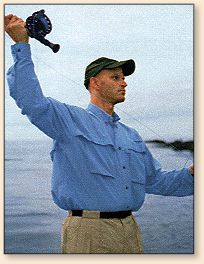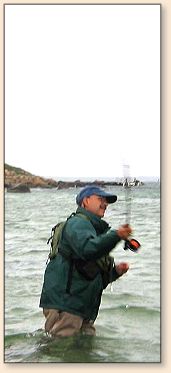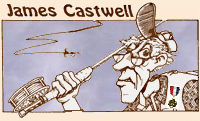|
"Ah Spring!"
"Ah Nuts!" the connection? Your casting.
Over the winter some forget a few of the little
things, others start out with little experience
under their wader-belts at all. I am reminded
of a very common problem which is perfectly
natural but holds back many from becoming darn
good at casting. Especially casting over thirty
feet.
Now, given, most trout are fished to and caught
well under that distance, but a lot of fly fishing
is done at greater distances than that. Or at least,
if a guy could cast farther than that, he would.
Here is a picture of a guy casting. You probably
have seen pictures like this for years, looks
really great. His arm way up and out, looks like
a statue or something. The problem is this. To make
a rod function well you need to stop the rod. Period.

Now, if you have not done this before now,
I am serious, I want you to, as you are
reading this, do a little experiment. Hold
your right arm like you were going to hammer
something. Ok, now put your left hand on your
right bicep and make the hammering motion with
your right arm. Notice how you can feel the
right bicep work? Ok, now raise your right arm
straight up in the air and while still holding
your left hand on the right bicep, make some
hammering moves with your right arm. Nothing,
right? With the arm up, the bicep does nothing.
Is that not the main muscle you use to stop the
rod? Certainly is or at least, darn well better be.
 Here is another picture, happens to be of Dave
Micus casting into the light surf. Pay particular
attention to the position of his right arm. As
perfect a casting form as anyone could want.
And if you give it some thought, why is he
doing it that way? Because it works that way!
Dave is coming through like Mike Tyson with a
body shot. Power, controlled and stopped hard.
That cast went a country mile. And so will yours.
Here is a reason maybe you aren't doing it like
that though.
Here is another picture, happens to be of Dave
Micus casting into the light surf. Pay particular
attention to the position of his right arm. As
perfect a casting form as anyone could want.
And if you give it some thought, why is he
doing it that way? Because it works that way!
Dave is coming through like Mike Tyson with a
body shot. Power, controlled and stopped hard.
That cast went a country mile. And so will yours.
Here is a reason maybe you aren't doing it like
that though.
Most of the old rods, some cane, all fiberglass
and a lot of early graphite were soft. That is,
they bent a lot. To make them perform better we
would often try to make them longer by extending
our arm. For some casting it helped, a longer
lever gave us some added distance. But when it
comes to stopping the rod, it impedes our progress.
Learn to stop the rod hard, within reason, no
matter how long the cast. It will give you more
line control and much better casting.
Remember this too, people will watch you once
you get better. They pay no attention to the
poor casters, nothing to be learned from watching
them. Get used to the audience and then try to
pass the information along. ~ JC
|



 Here is another picture, happens to be of Dave
Micus casting into the light surf. Pay particular
attention to the position of his right arm. As
perfect a casting form as anyone could want.
And if you give it some thought, why is he
doing it that way? Because it works that way!
Dave is coming through like Mike Tyson with a
body shot. Power, controlled and stopped hard.
That cast went a country mile. And so will yours.
Here is a reason maybe you aren't doing it like
that though.
Here is another picture, happens to be of Dave
Micus casting into the light surf. Pay particular
attention to the position of his right arm. As
perfect a casting form as anyone could want.
And if you give it some thought, why is he
doing it that way? Because it works that way!
Dave is coming through like Mike Tyson with a
body shot. Power, controlled and stopped hard.
That cast went a country mile. And so will yours.
Here is a reason maybe you aren't doing it like
that though.